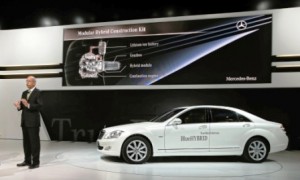
“The industry has done a good job of making people comfortable with hybrid technology, but the economic equation is not there.”
The largest maker of automotive batteries in the world said today that without government subsidies, the batteries used in electric vehicles and hybrids will not allow for commercialization on a large scale.
The analysis is significant since Johnson Controls launched the industry’s first mass production lithium-ion battery plant in France, and is a leader in battery technology.
In a presentation to analysts today, MaryAnn Wright, Vice President and Managing Director Business Accelerator for Advanced Energy Storage Solutions at Johnson said that a positive economic equation is not possible without subsidies of at least $7,500.
“We can achieve — with subsidies — a total cost of ownership that is competitive with internal combustion engines,” Wright said. She was using a three-year analysis of a vehicle, which included an above average retention residual value.
However, even with Johnson’s goal of reducing costs of advanced Li-ion batteries by 50% during the next five years, taxpayer grants are still needed for mass production.
Longer term, with the help of government subsidies, Wright said Johnson is looking to deliver an almost 100% battery cost decrease by 2020, while increasing the energy density by seven times to give EVs and hybrids a viable range running while on battery power.
The lack of a rational or consistent energy policy remains an impediment in the U.S., according to Wright, to the development of cleaner vehicles. Still, she maintains that there is growth potential in the segment.
“The industry has done a good job of making people comfortable with hybrid technology, but the economic equation is not there,” said Wright.
Johnson has been successful at garnering U.S. government grants from the Department of Energy to build domestic hybrid battery manufacturing capacity, with $450 million awarded in grants thus far. The global advanced battery market could range from $35-$70 billion by 2020, according to the company.
Johnson is currently a supplier for the Mercedes-Benz S-Class hybrid that is in European and U.S. showrooms now, and the BMW 7 Series ActiveHybrid, which will be in production later this year.
The S 400 hybrid is the first series production vehicle featuring a high-performance lithium-ion battery. With its battery and compact hybrid module with disc-shaped electric motor, the system offers a claimed double benefit: the electric motor not only acts as a starter, but can also back up the modified V6 gasoline engine during the acceleration, or can recover energy during braking and feed this to the lithium-ion battery. With a fuel consumption of 7.9 liters per 100 kilometers (NEDC), the large sedan has the lowest CO2 emissions in its segment.
Johnson is also the exclusive supplier of plug-in hybrid battery systems to Ford Motor Company, which are due in showrooms in 2012. In addition, Johnson has just reached an agreement with Jaguar Land Rover to develop hybrids with the Tata owned luxury carmaker.
As with all other automotive suppliers, Johnson has been severely challenged by the ongoing Global Great recession and has moved most of its U.S. production offshore to low cost, non-union countries.
